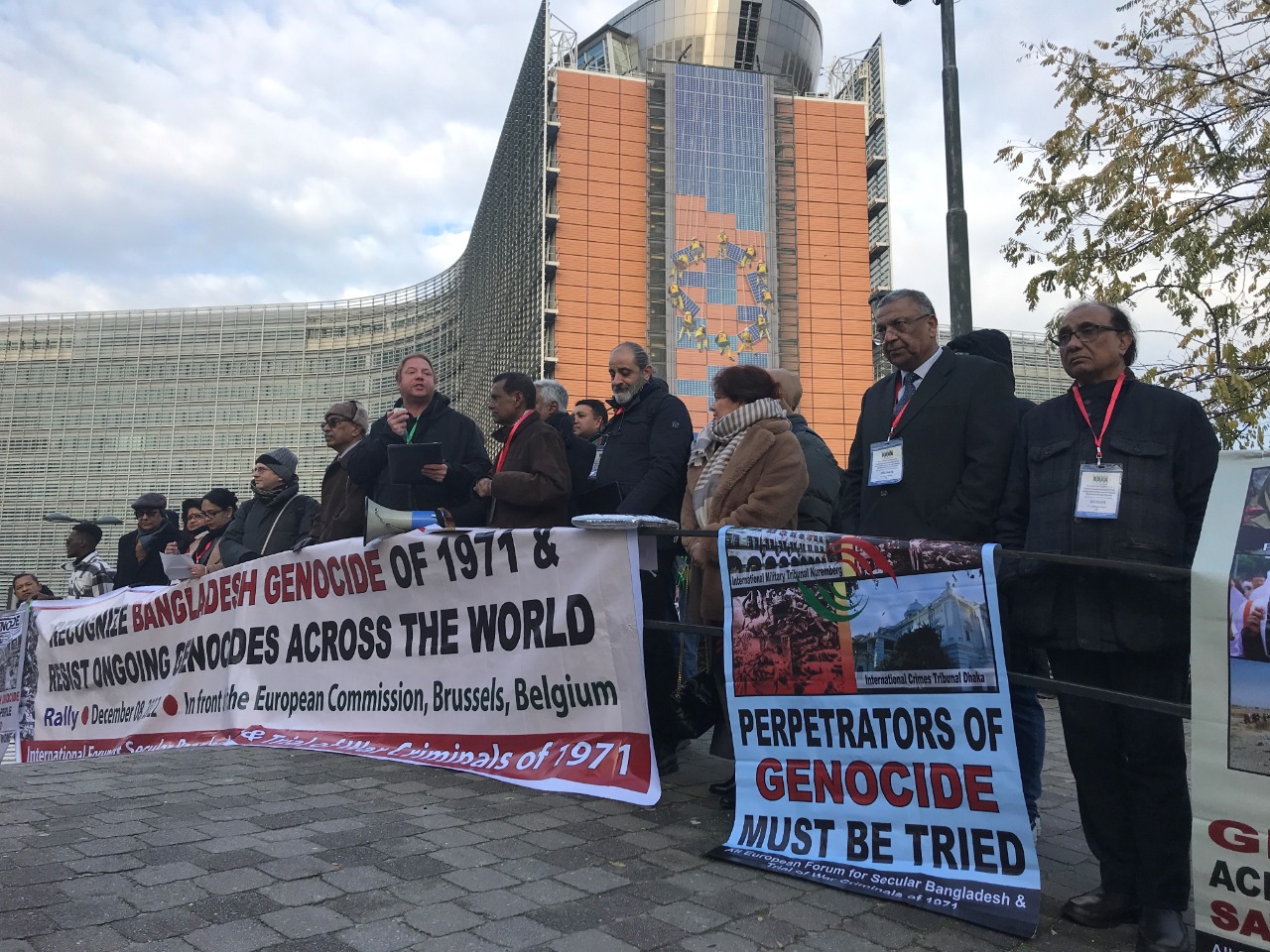From Brussels: On UN’s International Genocide Remembrance and Prevention Day, human rights leaders of the world paid respect to the three million martyrs of Bangladesh who died in the Liberation War of 1971 at the Meet the Press event held at the Brussels Press Club on the second day of the two-day international human rights conference organised by the International Forum for Secular Bangladesh on Friday, 9 December.
International human rights leader, a former member of the European Parliament, Portuguese politician, and executive director of the South Asia Democratic Forum, Paulo Casaca, chaired the event. Opening remarks were made by Shahriar Kabir, President of the International Forum for Secular Bangladesh. Others who were present and spoke were the President of the World Sindhi Congress, Dr Lakhumal Luhana, President of Turkey’s 21st Century Forum for Humanity, Ferhat Atik, Chairman of Polish human rights organisation Never Again, Dr Rafal Pankowski, Afghan women’s human rights organiser exiled in Germany, Arya Sooriya, Executive President of Baloch Human Rights Council Dr Nasir Dashti, Polish human rights activist Natalia Sineaeva-Pankowska, a member of Never Again, UK-based security analyst Indian writer Priyajit Debsarkar, Uzbekistani human rights activist Fayzullo Nematov, Burundian social worker Amissa Ntakirutiman and Rwandan human rights activist Andrew Rubanzangabo.
Dr Nuzhat Choudhury, daughter of Martyred Dr Alim Choudhury, Asst General Secretary of the International Forum for Secular Bangladesh, read out the memorandum submitted to the EU Parliament demanding international recognition of the 1971 genocide. The memorandum read, ‘WHEREAS between 25 March and 16 December 1971, the Pakistani occupation army and its local collaborators conducted a systematic genocidal attack against the Bengali nation and Hindu religious groups. It caused the annihilation of 3 million people in Bangladesh and the rape of over two hundred thousand women. Ten million helpless people were forcibly driven out of their homeland to neighbouring India, where they took refuge for months,’ and demanded that the international community bring the perpetrators to justice. The Meet the Press event was conducted by human rights activist Asif Munier Tonmoy, son of martyred Professor Munier Chowdhury. European Forum for Secular Bangladesh President Tarun Kanti Chowdhury and European branch leaders were present at the event.
President of the World Sindhi Congress, Dr Lakhumal Luhana, in his speech, demanded international recognition of the genocide by the Pakistani invading forces in 1971 and said that the context of this genocide was created in 1952. But Bengalis protected the right to their language with their blood. They chased the Pakistani invaders from their land, losing three million lives. He said that the Bengali nation is our inspiration for the Sindhi nation’s struggle against the oppression of the Pakistani invaders.
Executive President of Baloch Human Rights Council Nasir Dashti said the Baloch understood the struggle of the people of Bangladesh, and we supported the Bengali liberation struggle. So we are continuing our struggle with inspiration from the struggle of Bengalis half a century ago.
Chairman of the human rights organisation Never Again in Poland, Rafal Pankowski, said, “No more genocide” in the world, along with this slogan, “We want international recognition and justice for all genocide” – the peace-loving world should raise this slogan. We have to do this by recognising the Bengali genocide of 1971.
President of Turkey’s 21st Century Forum for Humanity, Mr Ferhat Atik, said, “The mass killings organised by the Pakistani forces in the name of religion in 1971 is a stain on the believers of the world.” International recognition of this genocide is necessary to erase this stigma. The world community cannot ignore the movement for this recognition.
President of the Meet the Press program, Executive Director of South Asia Democratic Forum, former MEP Paolo Casaca, pointed to America and Europe and said, “What kind of hypocrisy is it to advise on the human rights of different countries of the world while wanting to avoid the recognition of human rights violated by the most brutal genocide in history half a century ago.” He said that the Bengali genocide of 1971 was a stain on civilisation. Therefore, recognise this genocide only to establish yourselves as leaders of a civilised world.
The event’s opening speaker, Shahriar Kabir, President of Forum for Secular Bangladesh, expressed his gratitude for the continued support of world human rights leaders to recognise the Bangladesh genocide and bring those involved to justice. He added that this unprecedented support of human rights leaders in today’s movement to recognise the genocide that took place fifty years ago proves the position of peace-loving people on behalf of humanity. We are grateful.
Former Justice Shamsuddin Chowdhury Manik, President of the South Asian Peoples Union against Fundamentalism and Communalism, delivered the concluding speech.
The Press Conference was part of a two-day international conference held in Brussels on 8 and 9 December at the initiative of the All-European Forum for Secular Bangladesh to demand international recognition of the genocide of Bangladesh and to prevent the ongoing genocides in Myanmar, Afghanistan, Pakistan and the world and the safe return of the Rohingya refugees who have taken shelter in Bangladesh, the victims of genocide in Myanmar. Lawmakers, politicians, intellectuals, cultural activists, and leaders of human rights and peace movements from fifteen countries, including Bangladesh, took part in the conference.
On 8 December, a human chain program with banner festoons was held in front of the European Commission in Brussels. Chaired by Justice Shamsuddin Chowdhury Manik, the human chain was attended, among others, by Belgian human rights activist Andy Vermaut, 21 Century Forum for Humanity Turkish writer filmmaker Ferhat Atik, Executive President of Baloch Human Rights Council Dr Nasir Dashti, President of Never Again in Poland Social Scientist Dr Rafael Pankowski, Exiled Afghan human rights activist Arya-Sooriya in Germany, Uzbekistan human rights activist Fayzullo Nematov among others. Later, an international conference was held at Baitul Mujib Auditorium in Brussels. At the end of the conference, journalist Shahriar Kabir’s documentary “Voice of Conscience” on genocide in Bangladesh was screened.

